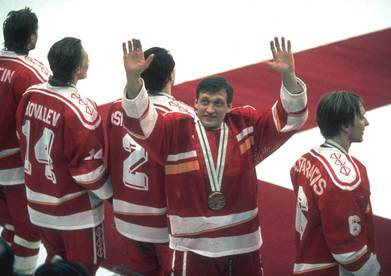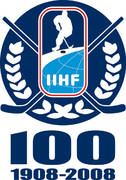Story #59
February 23, 1992 – Albertville, France
The days of the Soviet hockey superiority were over. Even the Soviet Union as a country had ceased to exist on December 26, 1991, when the USSR dissolved and was replaced by the Commonwealth of Independent States. During the 1992 IIHF World U20 Championship in Germany, the Soviet team had to change its name from Soviet Union to CIS midway through the tournament, on January 1, 1992.
Roughly one month later, the Olympics were about to begin in Albertville, France. Authoritarian head coach Viktor Tikhonov had lost virtually all the power he had during the 1970s and ‘80s, and his famous “Green Unit” with Fetisov, Kasatonov, Larionov, Krutov and Makarov were all playing in the NHL.
Tikhonov had to change his approach to coax veterans Vyacheslav Bykov, Andrei Khomutov and Alexei Zhamnov play for him and also to get the maximum out of whimsical youngsters such as Darius Kasparaitis, Alexei Kovalev, and Yevgeni Davydov.
Despite the absence of superstars, the Soviet/Russian team had no problems with talent but with identity. The famous lettering “CCCP” on the sweaters had been taken away, only to be replaced by nothing. After each victory on ice, there was no national anthem, only the Olympic hymn. Finally, the national red flag with hammer and sickle was also gone. The players were told to salute the Olympic rings instead.
All symbols aside, the team played traditional Soviet hockey in the small Albertville arena. It lost one preliminary round game, to Czechoslovakia, but defeated the Eric Lindros-led Team Canada and cruised comfortably to the playoffs. The Russians defeated Finland 6-1 in the quarter-finals, Team USA 5-2 in the semis, and faced historic foe Canada in the first-ever one-game-wins-all Olympic final.
The Canadians, without NHL players, competed as well as they could, but they were outmatched by the far more talented Russians, who won 3-1. Usually, when the old Soviet teams won gold medals, the players and coaches were composed, showing very little emotion. This group was different. After the final horn, they jumped around like school kids and held leader Vyacheslav Bykov aloft in a “golden chair”. They listened rather listlessly to an anthem that wasn’t theirs and after the gold medal ceremony the players gathered around Viktor Tikhonov and produced one of the few team pictures where the old coach looked genuinely happy.
After the game, Tikhonov didn’t want to leave the press conference. He stayed behind after the official question period was over, eager to tell everyone through an interpreter that he valued this Olympic gold medal more than all the other wins in his 14 years behind the national team bench. “We had no stars. We won this Olympic gold with youngsters. This is why I am so happy,” he said.
This was Tikhonov’s last hurrah in international hockey. He would return for the 1994 Olympics and also for the 2003 World Championship, but with no success. Eventually, the IIHF erased all trace of “CIS” in the record books and credited the gold medal to the new nation, Russia.
As part of the IIHF's 100th anniversary celebrations, www.IIHF.com is featuring the 100 top international hockey stories from the past century (1908-2008). Starting now and continuing through the 2008 IIHF World Championships in Canada, we will bring you approximately three stories a week counting down from Number 100 to Number 11.
The Final Top 10 Countdown will be one of the highlights of the IIHF's Centennial Gala Evening in Quebec City on May 17, the day prior to the Gold Medal Game of the 2008 World Championship.
These are the criteria for inclusion on this list: First, the story has to have had a considerable influence on international hockey. Second, it has to have had either a major immediate impact or a long-lasting significance on the game. Third, although it doesn't necessarily have to be about top players, the story does have to pertain to the highest level of play, notably Olympics, World Championships, and the like. The story can be about a single moment — a goal, a great save, a referee's call — or about an historic event of longer duration — a game, series, tournament, or rule change.
|
 |
Click here for the 100 Top Stories
|










